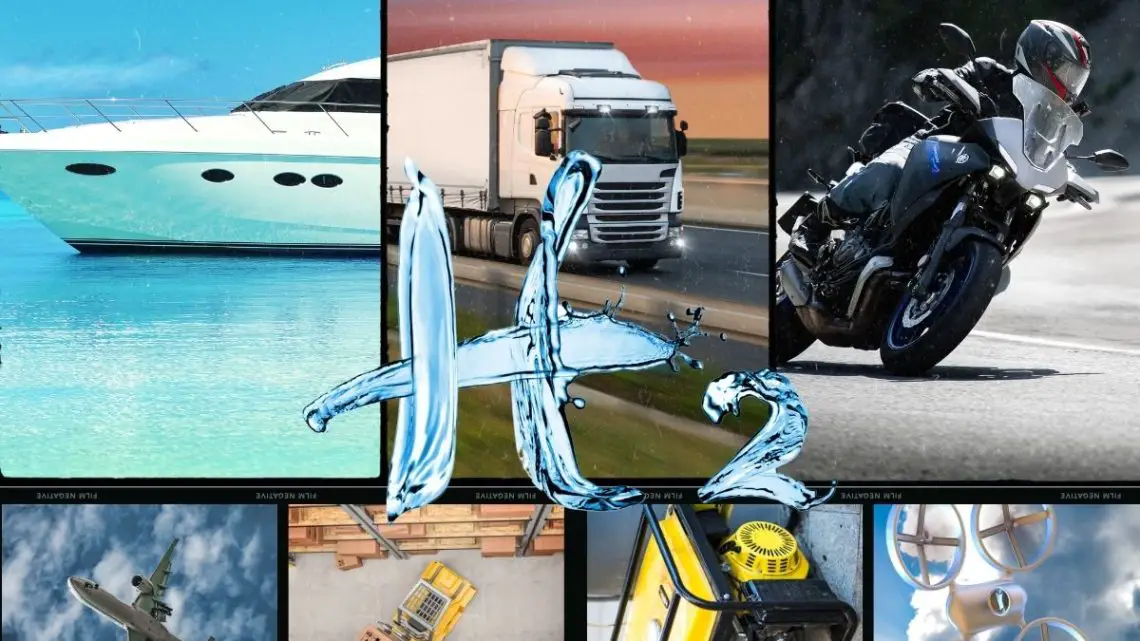
Beyond Autos: 8 Surprising Applications of Hydrogen Fuel Technology
December 26, 2023Though H2 cars have been making headlines, there are many other uses for this technology.
As the world seeks to decarbonize, a growing number of industries and individual companies have been turning to the hydrogen fuel to provide zero-emission energy for a surprising spectrum of applications.
Many of these uses haven’t received the media attention cars have had but remain fascinating, nonetheless.
The following are some of the places hydrogen fuel technology has been seeing substantial growth in use, without the notice of much of the media. While regular readers of Hydrogen Fuel News might be familiar with some on this list, others are certain to surprise you.
Here are 8 hydrogen fuel applications you might not have considered before now.
- Aircraft – A number of experimental aerospace projects are underway to help better understand the way H2 can be used to power flights of various ranges, from relatively local to long-hauls. ZeroAvia has made notable headlines for several years due to its successful efforts to advance the technology through test flights for commercial use. That said, bigger names such as Airbus have also joined in to pursue commercial flight powered by hydrogen.
- Watercraft – Boats and submarines alike have been used in H2 tests, including everything from vessels that would refuel when they dock to those that would generate their own H2 onboard using electrolyzers powered by solar panels or wind turbines.
- Warehouse logistics – Massive companies with huge warehouses and complex distribution requirements are powering their forklifts, pallet trucks and tractor trailers with hydrogen fuel cells to be able to operate emission-free while enhancing the air quality for employees.
- Global distribution – Companies from Toyota to Hyundai, from UPS to Kenworth, and even Nikola are developing H2-powered transport and delivery vans and semi-trucks to decarbonize local distribution and long-haul trucking.
- Backup Power – Stationary hydrogen fuel cells are proving to be increasingly popular backup or emergency power generation options, replacing diesel generators at facilities where power supply uptime is critical, such as data centers and hospitals.
- Mobile Power – Remote locations such as construction sites can greatly benefit from power generation using H2 as they often do not have any access to the grid and would otherwise rely on diesel power generation for this purpose. Hydrogen fuel cell alternatives are quieter and carbon emission free.
- UAVs – Unmanned aerial vehicles (UAVs) are being used in a vast variety of uses nowadays and are only expected to be introduced to more applications in the future. They are being involved in everything from viewing the aftermath of catastrophes to assessing damage for insurance claims, and from search and rescue operations to package delivery. Civilian and military applications alike are growing quickly and need greater power and range than is possible with battery electric technology.
- Motorcycles – A new frontier in hydrogen fuel applications is being explored by major motorcycle manufacturers. For instance, Kawasaki is developing a supercharged hydrogen-fueled motorcycle. This technology uses a supercharger to compress air before it enters the cylinder and applies high-pressure direct fuel injection to introduce hydrogen into the combustion chamber. The challenge lies in storing hydrogen due to its high volume-to-energy ratio compared to gasoline. Yet, with ongoing research and development, hydrogen motorcycles could offer a significant contribution to a greener future in motorcycling
More hydrogen fuel cell applications are always being introduced
This list is only a short introduction to some of the surprising areas in which hydrogen fuel cells have been making substantial progress. From vehicles to off-the-grid power and various industries that are difficult to decarbonize (such as steel making and chemicals), new uses for this type of clean energy are being regularly identified.
As the cost of the production of H2 continues to fall – particularly when it comes to green hydrogen made using renewable energy – the interest in using this technology to decarbonize is only expected to grow. Until then, many companies are seeking to secure their places in this area so they will already have a position of leadership when the clean hydrogen fuel market truly takes off at a mainstream level worldwide.



 HFN News is your leading source for fresh hydrogen and renewable energy updates. Amid the fast-paced growth of hydrogen companies, we provide top-notch news and insights about this exciting sector. Our coverage spans from hydrogen cars to global sustainable initiatives, and we highlight the latest in green jobs and developing hydrogen hubs. We invite you to share your local hydrogen news and explore today’s renewable energy job listings on our site. Thanks for choosing HFN News as your trusted guide to the hydrogen and renewable energy world!
HFN News is your leading source for fresh hydrogen and renewable energy updates. Amid the fast-paced growth of hydrogen companies, we provide top-notch news and insights about this exciting sector. Our coverage spans from hydrogen cars to global sustainable initiatives, and we highlight the latest in green jobs and developing hydrogen hubs. We invite you to share your local hydrogen news and explore today’s renewable energy job listings on our site. Thanks for choosing HFN News as your trusted guide to the hydrogen and renewable energy world!